| Srl | Item |
| 1 |
ID:
126921
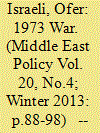

|
|
|
| 2 |
ID:
121470
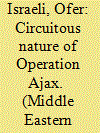

|
|
|
|
|
| Publication |
2013.
|
| Summary/Abstract |
In seeking to protect its economic interests and its control of oil resources in Iran, Britain planned to overthrow Iranian Prime Minister Dr Mohammad Mossadegh in a military coup d'état following his decision to nationalize the Iranian oil industry in 1951. However, the British initially faced strong opposition to this plan from the US under the Truman administration, which preferred a more diplomatic approach to the crisis and did not see British interests as being in line with its own. Facing this opposition and after unsuccessful attempts to oust the Iranian leader through economic pressure and propaganda campaigns, the British skillfully leveraged American fear of Communism to secure Washington, under the Eisenhower Administration, as a partner to lead a joint US-UK mission to overthrow Mossadegh. This paper explores the reasons behind the shift in American policy regarding this issue, exploring whether it was the Brit's successful use of covert, circuitous tactics to achieve their intended outcomes or solely a result of ideological differences between the two US administrations.
|
|
|
|
|
|
|
|
|
|
|
|
|
|
|
|
| 3 |
ID:
141611
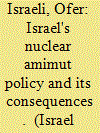

|
|
|
|
|
| Summary/Abstract |
In neither admitting nor denying its nuclear capabilities, Israel has adopted a policy of amimut, or ‘ambiguity’ in regard to its nuclear policy. By not acknowledging its nuclear capabilities, Israel has actually strayed from the traditional tenets of rational deterrence theory, which states that deterrence can be achieved when a state credibly communicates its capabilities and intent. Incredibly, despite the fact that Israel has not followed these tenets, it has still managed to achieve effective deterrence against non-conventional attacks, and furthermore avoid the automatic dire rebound results that typically accompany the build-up of arms in the international community. As successful as this approach has been, amimut has also resulted in the negative side effect of undermining Israeli democracy and perceived political control over national security affairs. This article explores the positive and negative impacts of this unique policy, and the consequences of maintaining or abandoning the policy of amimut.
|
|
|
|
|
|
|
|
|
|
|
|
|
|
|
|
| 4 |
ID:
185231
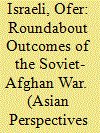

|
|
|
|
|
| Summary/Abstract |
This paper demonstrates that when a superpower within a bipolar system fights against a small rival either that is located beyond its sphere of influence or that has geostrategic importance to the other acting superpower, other forces matter more than the distribution of capabilities between the belligerents. Within the study I review two primary explanations for the Soviet withdrawal from Afghanistan. Despite the strong resistance of local forces to the Soviet presence in Afghanistan, mainly by the Afghan Mujahedeen, Moscow failed to predict the political outcomes of the war. It was in fact a series of negative feedbacks that caused Soviet withdrawal from Afghanistan after a decade-long intervention that did not achieve any political goals. One such example was the direct strike against the Soviet presence in Afghanistan, launched and coordinated by the United States as the other acting superpower under the bipolar system of that time.
|
|
|
|
|
|
|
|
|
|
|
|
|
|
|
|
| 5 |
ID:
121516
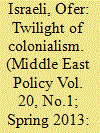

|
|
|
| 6 |
ID:
190804
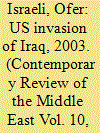

|
|
|
|
|
| Summary/Abstract |
This study will describe an indirect link of the US Invasion of Iraq (2003) and test how the US occupation of Iraq served, from an American perspective, as a derivative product with negative side effects several years later in the Middle East. In seeking to understand the dynamic of any event in foreign policy, political scientists need to be aware of the role and spread of key ideas and how they emerged, developed, and eventually influenced events. Accordingly, analysis of existing perceptions should also consider the critical impacts of past events and crises. “The power of the ideas,” as presented by the rebirth of the ancient idea of the Muslim Caliphate, was mostly covert throughout the years. However, understanding this event requires examining the formative influence of the US Invasion of Iraq (2003), which ended with the Islamic State taking power in Iraq and al-Sham (ISIS). This radical group has declared a Muslim Caliphate and claims control over a large area of Iraq and Syria.
|
|
|
|
|
|
|
|
|
|
|
|
|
|
|
|